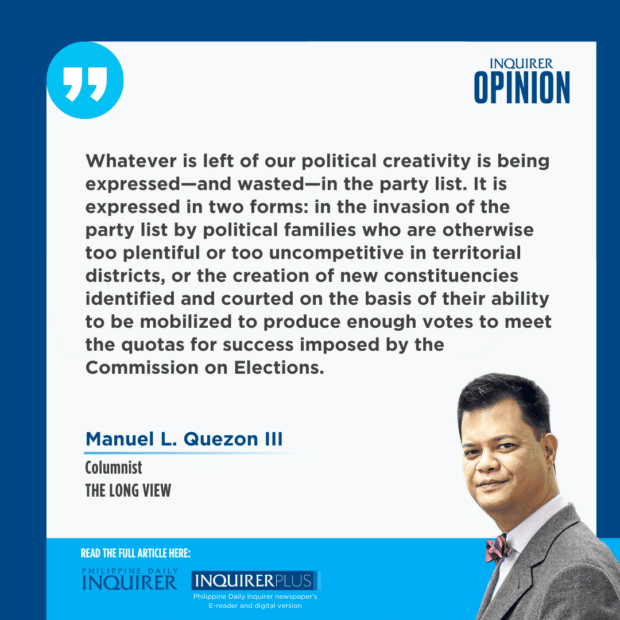
Whatever is left of our political creativity is being expressed—and wasted—in the party list. It is expressed in two forms: in the invasion of the party list by political families who are otherwise too plentiful or too uncompetitive in territorial districts, or the creation of new constituencies identified and courted on the basis of their ability to be mobilized to produce enough votes to meet the quotas for success imposed by the Commission on Elections.
After all, the 1987 Constitution itself decrees the family as the fundamental social institution and the foundation of the nation—how then, can Congress deprive it of its role in politics? It transcends borders: in Europe, meeting overseas Filipino worker (OFW) groups, I discovered many of them are led by former mayors, councilors, etc., who became OFWs themselves; it was inevitable that families would insinuate themselves into the party list. Families contain multitudes, as the Tulfos best demonstrate. The patriarch having been a soldier, each son became, in a sense, a regional head, learning the language and ways of the area in which he was born; collectively, the Tulfos are formidable not only because of their name and shame tactics in media, but because they themselves are a national coalition and thus, well-placed to make national appeals.
The problem, of course, is that candidates perfectly qualified for the Senate are unelectable, while the electables are in the main, completely unqualified for the Senate, which was meant to ensure a national perspective in lawmaking, serving, because of that, as a training ground for the presidency. Back when the Senate became nationally elected, even then, the framers of the 1935 Constitution and its amendments recognized that celebrity and money are the weaknesses of national office, and so instituted bloc voting which is best understood as a party list system alternative to writing individual names. But this was abolished, and it’s no coincidence that soon after, the system began to weaken when candidates, who found less and less use for parties, began to innovate by becoming guest candidates, while those with celebrity and money increasingly displaced those with experience and knowledge.
Today, the candidates closest to the expectations of the older generations as to who should be a senator, only have a hope of being elected by running in the party list. This leaves the Senate increasingly in the hands of those unfit to defend the institution from abolition. Constituencies, formerly too small or dispersed to meaningfully affect territorial representation, can now vote in exponents to the party list: consider abused and aggrieved motorcycle riders, for example—that’s democracy and a deserving innovation.
The problem for territorial-based districts in the House, is threefold: fewer and fewer are interested in entering politics; more and more voters are new migrants to their areas, and thus, outside the carefully cultivated and nurtured webs of favors and shared experiences that politicians cultivate; and finally, voters who have no attachments to political families, demand a cash exchange for their votes, which makes elections increasingly expensive, which means local families, instead of competing, must divide offices among themselves, so they can afford to win political office.
This state of affairs has left everyone who still cares, unhappy. Even the politicians have ideas, ranging from the well-meaning (campaign finance reform on the German model, where the government funds political parties based on performance), to the utterly selfish (a unicameral parliament to put an end, once and for all, to the inconvenience of public opinion affecting the serious business of tayo-tayo politics). For others, ideas can range from federalism (whether presidential or parliamentary), unicameralism (again, whether presidential or parliamentary). But what everyone has in common is the frustrating realization that the system, as it’s currently mapped out in our country’s operating system—the Constitution—is unchangeable because no one has figured out a way to actually amend the Constitution, which remains in a 1987 time warp.
With the House and Senate in an institutional death spiral—the good cannot win, and those who do win, increasingly find it difficult to recoup the expense of winning—the only innovation left is what we’ve seen unfold in the 2025 budget, which, by the way, isn’t an election budget but the prize for those fortunate enough to win in May 2025 (the election budget was last year’s). That innovation is to pass on the cost of bribing the electorate—which as I’ve mentioned increasingly demands a strict cash quid pro quo for its votes—to the electorate itself, by means of stuffing the national budget with ayuda which requires legislators to serve as brokers between the government and the voters for handouts—replacing programs that operate on fixed rules.
—————
Email: mlquezon3@gmail.com; Twitter: @mlq3

